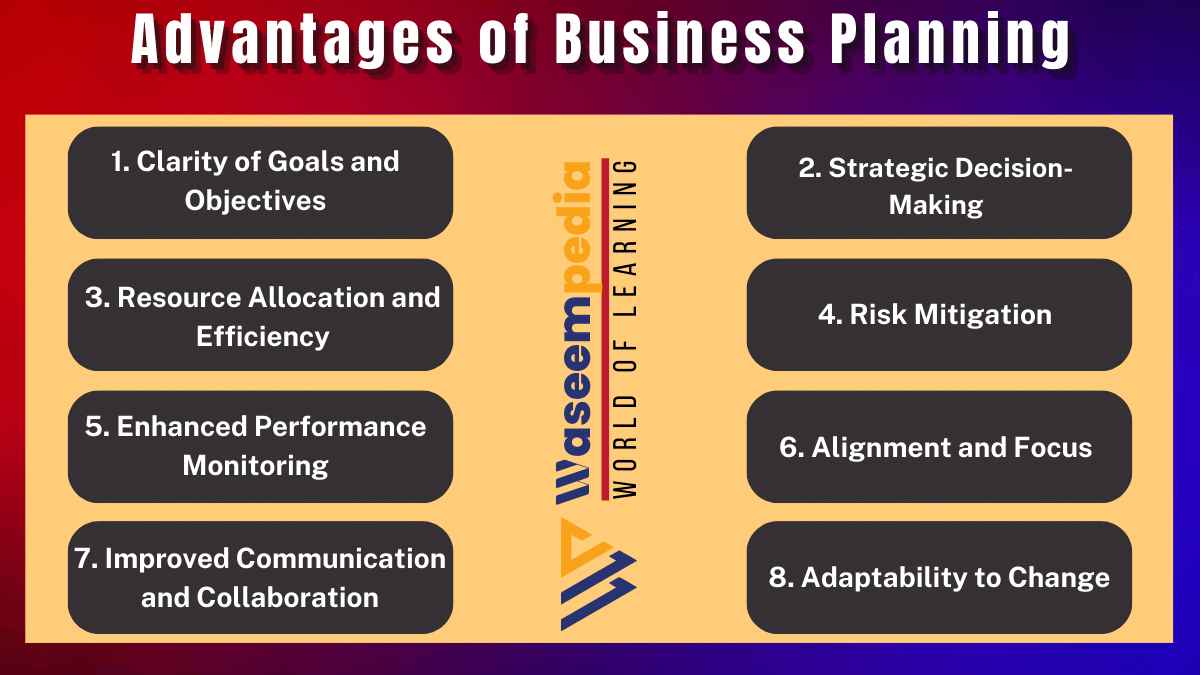Business planning offers numerous advantages that contribute to the success and growth of an organization. From providing clarity of goals and strategic decision-making to enhancing performance monitoring and fostering adaptability, business planning is a valuable process for any business. By investing time and effort into comprehensive business planning, organizations can lay a solid foundation for success and navigate the ever-changing business landscape with confidence.
Business planning is a crucial process that sets the foundation for success in any organization. It involves defining goals, developing strategies, and creating a roadmap to achieve desired outcomes. This article explores the advantages of business planning and highlights how it can drive growth, improve decision-making, and enhance overall organizational performance.

Business planning is a critical process that provides organizations with a roadmap for success. By outlining goals, strategies, and action steps, business planning enables businesses to make informed decisions, allocate resources effectively, and navigate the dynamic business landscape. Let’s explore the key advantages of business planning.
Advantages of Business Planning
There are many advantages of Business Planning before starting business but 9 Advantages of Business Planning are as following.
1. Clarity of Goals and Objectives
Business planning brings clarity to the goals and objectives of an organization. It allows stakeholders to define a clear vision of what they want to achieve and sets measurable targets to track progress. By establishing specific, actionable goals, businesses can focus their efforts and align their resources towards achieving desired outcomes.
2. Strategic Decision-Making
Effective business planning facilitates strategic decision-making. It provides a framework for evaluating various options and selecting the most viable and impactful strategies. By considering factors such as market conditions, competitive landscape, and internal capabilities, business planning helps businesses make informed decisions that are aligned with their long-term objectives.
3. Resource Allocation and Efficiency
Business planning enables efficient allocation of resources. By analyzing the resource requirements for each goal or strategy, organizations can allocate their financial, human, and technological resources optimally. This ensures that resources are utilized in the most efficient and effective manner, maximizing productivity and minimizing waste.
4. Risk Mitigation
Business planning allows organizations to identify and mitigate risks proactively. By conducting a thorough analysis of potential risks and developing contingency plans, businesses can minimize the impact of unforeseen events. Business planning encourages businesses to anticipate challenges, assess their potential impact, and implement risk mitigation strategies to safeguard their operations.
5. Enhanced Performance Monitoring
Business planning provides a basis for monitoring and evaluating performance. By establishing key performance indicators (KPIs) and benchmarks, organizations can measure their progress towards achieving their goals. Regular performance monitoring enables businesses to identify areas of improvement, make necessary adjustments, and ensure they stay on track towards their desired outcomes.
6. Alignment and Focus
Business planning promotes alignment and focus across the organization. It ensures that all departments, teams, and employees are working towards common goals and objectives. By aligning individual efforts with the overall strategic direction, businesses can foster a sense of unity, collaboration, and shared purpose.
7. Improved Communication and Collaboration
Effective business planning enhances communication and collaboration within an organization. It provides a framework for sharing information, ideas, and feedback among different stakeholders. Business planning encourages open communication, facilitates cross-functional collaboration, and promotes a culture of transparency and accountability.
8. Adaptability to Change
Business planning enables organizations to adapt to changing market conditions and dynamics. By regularly reviewing and updating their plans, businesses can respond to emerging trends, customer needs, and industry disruptions. Business planning encourages agility and flexibility, allowing organizations to seize new opportunities and navigate uncertainties with confidence.
9. Competitive Advantage
Business planning gives organizations a competitive advantage in the marketplace. By having a well-defined strategy and a clear roadmap, businesses can differentiate themselves from competitors. Effective business planning allows organizations to identify their unique value proposition, capitalize on their strengths, and position themselves as industry leaders.
Related Faq’s
What is the purpose of business planning?
The purpose of business planning is to set goals, outline strategies, allocate resources, and guide decision-making to achieve long-term success and growth in a structured and organized manner.
What are 5 reasons for a business plan?
Five reasons for a business plan:
Setting clear goals and objectives.
Attracting investors and lenders.
Guiding decision-making.
Managing resources effectively.
Measuring and tracking progress.
What are the advantages and disadvantages of business?
Advantages of a business:
Income generation
Economic growth
Job creation
Innovation
Personal fulfillment
Disadvantages of a business:
Financial risk
Uncertainty
Competition
Regulatory challenges
Work-life balance issues
What are the benefits of business plan competition?
Benefits of a business plan competition are as following.
Entrepreneurial Development: Fosters entrepreneurial skills and knowledge.
Feedback and Mentorship: Provides valuable feedback and access to mentors.
Visibility and Networking: Increases exposure and networking opportunities.
Funding Opportunities: Can lead to investment and financial support.
Validation: Validates the viability of business ideas.
What are the four 4 uses of a business plan?
Four uses of a business plan:
Guiding Growth: Provides a roadmap for business development.
Securing Funding: Attracts investors and lenders.
Managing Operations: Helps in day-to-day decision-making.
Setting Goals: Establishes clear objectives and targets.

